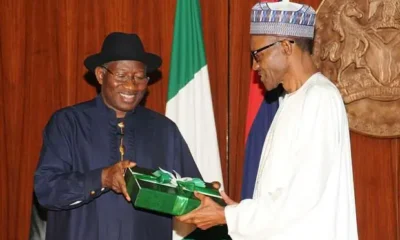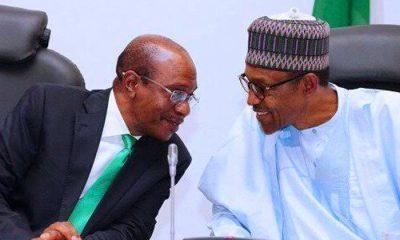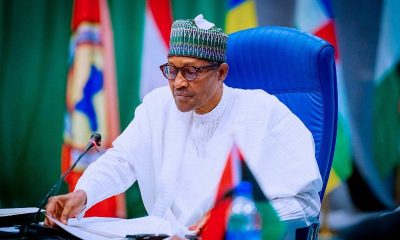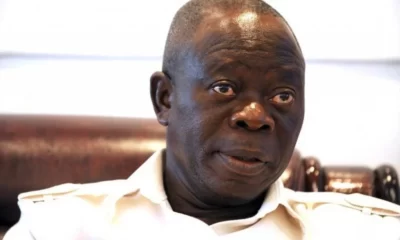Headline
FULL SPEECH: Buhari Addresses United Nations General Assembly
Published
2 years agoon
By
Editor
Nigeria’s President Muhammadu Buhari on Wednesday, addressed the 77th United Nations General Assembly in New York.
Below is the full speech of the Nigerian president.
Mr. President,
On behalf of the Government and people of Nigeria, I congratulate you on your well-deserved election as President of UNGA77. I assure you of the full support and cooperation of the Nigerian delegation during your tenure.
I commend your predecessor, His Excellency Abdullah Shahid, for the many remarkable achievements of the General Assembly under his leadership during these challenging times.
May I also congratulate the Secretary-General, Mr. Antonio Guterres on his ceaseless and untiring efforts to promote peace, security and development, very much in line with his exalted role.
Mr. President, The first time I could have addressed this August Assembly was in 1984, when I was the Military Head of State of the Federal Republic of Nigeria. Thirty-one years later, I had the great privilege to personally address the Assembly in 2015,as the democratically-elected President of my country. As I approach the end of my second and final four-year term, I am reminded of how much has changed in Nigeria, in Africa, and in the world, and yet, how some challenges remain.
We are now more severely tested by these enduring and new global challenges, paramount among which are conflicts increasingly being driven by non-state actors, proliferation of Small Arms and Light Weapons, terrorism, violent extremism, malignant use of technology, climate change, irregular migration, and disparities in opportunities for improved standards of living.
Despite the challenging international environment, the United Nations has proved that it can be strong when the will of its members is harnessed for positive collective action.
The guiding principle of this extraordinary institution is the promotion of peace and security, development and human rights.
Latest in a chain of events challenging these principles is the Ukraine conflict which has already created strains that are perhaps unprecedented for a generation.
Such a conflict will have adverse consequences for us all, hindering our capacity to work together to resolve conflicts elsewhere, especially in Africa, the Middle-East and Asia. Indeed, the ongoing war in Ukraine is making it more difficult to tackle the perennial issues that feature each year in the deliberations of this Assembly, such as nuclear disarmament, the right of the Rohingya refugees to return to their homes in Myanmar, and the Palestinians’ legitimate aspirations for statehood and reduction of inequalities within and amongst nations.
READ ALSO: PICTORIAL: UNGA: Bill, Hilary Clinton Host Akinwumi Adesina
The danger of escalation of the war in Ukraine further justifies Nigeria’s resolute calls for a nuclear-free world and a universal Arms Trade Treaty, which are also necessary measures to prevent global human disasters.
In this regards we must find quick means to reach consensus on the Nuclear non-proliferation Treaty with related commitments by nuclear weapon states.
I remain firmly convinced that the challenges that have come so sharply into focus in recent years and months emphasize the call by Nigeria and many other Member-States for the reform of the Security Council and other United Nations Agencies.
We need more effective and representative structures to meet today’s demands that have since outgrown a system designed for the very different world that prevailed at its foundation in 1945. Change is long overdue.
Mr. President, This is the first meeting we are having here in New York without the restrictions that characterised the last three years. The COVID-19 pandemic ripped across National borders like a toxic whirlwind, leaving in its wake a legacy of pain and loss.
Happily, we also witnessed an incredible level of innovation and creativity from those who devised treatments and vaccines. These laudable achievements were underpinned by partnerships and international cooperation.
We have also seen the bravery, care and endurance of health professionals at every corner of the globe.
I am happy to note that in Nigeria, our healthcare agencies were able to form effective local management and engaged international partnerships with multinational initiatives like COVAX and private groups like the Bill and Melinda Gates Foundation
These efforts helped mitigate the impact of the pandemic and we were mercifully spared the images of overwhelmed hospitals, overworked healthcare personnel and high mortality which sadly we saw elsewhere.
With COVID19, we saw very clearly how states tried to meet the challenge of a threat that could not be contained within national borders.
The results were mixed; but at its best, cooperation among stakeholders was outstanding. It facilitated solutions that saved countless lives and eased the huge burden of human suffering.
That same theme of unilateralism and the promotion of national interest competing with the common cause in the face of an existential threat has been our recurring experience in recent times.
In every address I have delivered to this august Assembly, I have dwelt on the issue of climate change, especially as it fuels conflicts and complicates food security.
READ ALSO: Biden Arrives UK For Queen Elizabeth’s Funeral
Climate change reduces opportunity and prosperity which, in Africa, Latin America and some parts of Asia, also contributes to transnational organized crimes.
As part of Nigeria’s efforts at achieving our Global Net-zero aspiration, the current Administration last year adopted a National Climate Change Strategy that aims to deliver climate change mitigation in a sustainable manner.
The measures we took at the national level also require climate justice. Africa and other developing nations produce only a small proportion of greenhouse gas emissions, compared to industrial economies.
Yet, we are the hardest hit by the consequences of climate change as we see in the sustained droughts in Somalia and floods of unprecedented severity in Pakistan.
These and other climate-related occurrences are now sadly becoming widely commonplace in the developing world. We are, in effect, literally paying the price for policies that others pursue. This needs to change.
At the COP26 in Glasgow last year, I did say that Nigeria was not asking for permission to make the same mistakes that others have made in creating the climate emergency.
Fortunately, we now know what we can do to mitigate the effects of the climate crisis and the related energy challenge. As a first step, we must all commit to releasing the financing and the technology to create a stable and affordable framework for energy transition.
Development Finance Institutions must prioritise de-risking energy projects to improve access of renewable projects to credit facilities. There should be no countries “left behind” in this equation.
Rocketing energy costs worldwide are, in part, the product of conflict and supply disruptions to Europe and the Americas. Yet, we are all paying the price. It is, therefore, our expectation that this UNGA 77 & the upcoming COP 27 will help galvanise the political will required to drive action towards the fulfilment of the various existing climate change initiatives.
Another feature of the last decade has been the growing partnership between states and the increasingly influential non-state actors.
There was a time when the most important event at this Assembly was the speech by the world’s most powerful leaders. Now a Tweet or Instagram post by an influencer on social or environmental issues may have greater impact.
READ ALSO: World Leaders, Four Billion Audience Bid Queen Elizabeth Farewell
Technology offers us nearly limitless opportunities and sometimes runs ahead of the imagination of regulators and legislators. At its best, social media helps strengthen the foundations of our society and our common values.
At its worst, it is a corrosive digital version of the mob, bristling with intolerance and division.
When I began my tenure as President in 2015, distinctions were drawn between the experience of poorer countries and those apparently better able to manage the avalanche of unfiltered information.
Nigeria has had many unsavoury experiences with hate speech and divisive disinformation. Increasingly, we also see that many countries face the same challenge. Clearly, data also know no borders.
In confronting these challenges, we must also come together to defend freedom of speech, while upholding other values that we cherish.
We must continue to work for a common standard that balances rights with responsibilities to keep the most vulnerable from harm and help strengthen and enrich communities.
Efforts to protect communities from the scourge of disinformation and misinformation must also be matched with efforts to reduce inequalities and restore hope to our poorer and most vulnerable of our communities as a means to stem the many socio-economic conflict drivers with which we are faced.
In spite of our efforts, humanitarian crises will continue to ravage some of our communities. Nigeria, therefore, implores our global partners to do more to complement our endeavours.
Indeed, the multifaceted challenges facing most developing countries have placed a debilitating chokehold on their fiscal space. This equally calls for the need to address the burden of unsustainable external debt by a global commitment to the expansion and extension of the Debt Service Suspension Initiative to countries facing fiscal and liquidity challenges as well as outright cancellation for countries facing the most severe challenges.
Mr. President, Your Excellencies, Distinguished Delegates, Democracy is an idea that crosses time and borders. Certainly, democracy does have its limitations. The wheels of democracy turn slowly. It can demand compromises that dilute decisions.
Sometimes, it bends too much to special interests that exercise influence, not always for the general good, in a manner disproportionate to their numbers.
But it has been my experience that a democratic culture provides a Government with the legitimacy it needs to deliver positive change.
In Nigeria, not only have we worked to strengthen our democracy, but we have supported it and promoted the Rule of Law in our sub-region.
In The Gambia, we helped guarantee the first democratic transition since independence. In Guinea-Bissau we stood by the democratically-elected Government when it faced mutiny.
And in the Republic of Chad, following the tragic death of its President, the late Idris Deby Itno in the battlefield, we joined forces with its other neighbours & Int’l partners to stabilize the country & encourage the peaceful transition to democracy, a process which is ongoing.
We believe in the sanctity of constitutional term limits and we have steadfastly adhered to it in Nigeria. We have seen the corrosive impact on values when leaders elsewhere seek to change the rules to stay on in power.
Indeed, we now are preparing for general elections in Nigeria next February. At the 78th UNGA, there will be a new face at this podium speaking for Nigeria.
Ours is a vast country strengthened by its diversity and its common values of hard work, enduring faith and a sense of community. We have invested heavily to strengthen our framework for free and fair elections.
I thank our partners for all the support that they have provided our election institutions.
As President, I have set the goal that one of the enduring legacies I would like to leave is to entrench a process of free, fair and transparent and credible elections through which Nigerians elect leaders of their choice.
Mr. President, The multiple challenges that face us are truly interconnected and urgent, and your choice of this Session’s theme, “A watershed moment: transformative solutions to interlocking challenges” is apt.
In keeping with our obligations as Member States of this noble Organisation, we all must do our utmost to work with you toward resolving them. In this regard, I reiterate my Delegation’s full and resolute cooperation.
READ ALSO: World Leaders Gather For Queen Elizabeth’s Funeral
Let me convey my final reflection from this famous podium. We live in extraordinary times with interdependent challenges but enormous opportunities. The pace of change can seem bewildering, with sometimes a palpable and unsettling sense of uncertainty about our future.
But if my years in public service have taught me anything, it is that we must keep faith with those values that endure. These include, but are not limited to, such values as justice, honour, integrity, ceaseless endeavour, and partnership within and between nations.
Our strongest moments have always been when we remain true to the basic principles of tolerance, community, and abiding commitment to peace and goodwill towards all. I thank you all.
You may like


Appeal Court Declines To Order CCB To Reveal Assets Of Jonathan, Buhari, Others


6.2m Theft: FG Declares CBN Staff, Others Wanted For Forging Buhari’s Signature


Court Declares Buhari’s Appointment Of FCC Chair, Secretary Illegal


Nigerians ‘Most’ Difficult People To Govern – Buhari


PHOTOS: Oba Of Benin Visits Buhari In Daura


Buhari Was Servicing Debt With 96% Nation’s Income – Oshiomhole
Headline
Best Airports In Africa For 2024 Named, Nigeria Missing [Full List]
Published
47 mins agoon
April 19, 2024By
Editor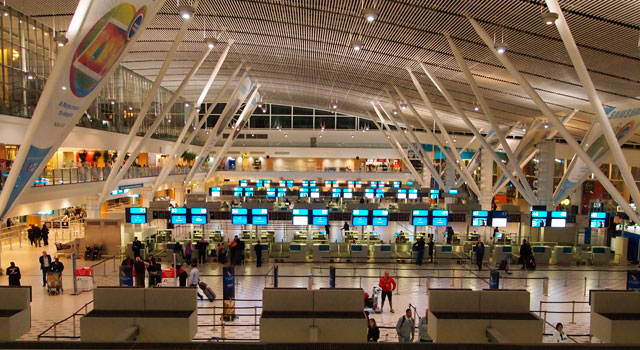
Skytrax, a UK-based airline and airport review and ranking site has named Cape Town International Airport in South Africa as the best airport in Africa for 2024.
This came after Skytrax conducted a survey from August 2023 until March 2024, in which respondents are polled on a variety of areas, from check-in, arrivals, transfers, shopping, security and immigration, through to departure. Over 100 customer nationalities participated in the survey.
It was also stated that Cape Town airport has the ‘Best airport staff service in Africa’ while Durban King Shaka Airport, which came second, had an additional award for ‘Best regional airport in Africa’.
READ ALSO: CBN Gives New Directive On Lending In Real Estate
Johannesburg’s Tambo International Airport came third, while the Mohammed V International Airport serving Casablanca, Morocco, polled fourth.
At fifth place was Sir Seewoosagur Ramgoolam International Airport in Mauritius, with Morocco making another entry via Menara Airport in Marrakesh for sixth place.
Addis Ababa’s Bole International Airport, the hub of Ethiopian Airline, was ranked seventh, while the Kigali International Airport in Rwanda scooped the eight spot.
READ ALSO: Military Aircraft Bomb Illegal Refining Sites In Rivers
Cairo International Airport in Egypt took the ninth position while Kenya’s Jomo Kenyatta International Airport had the tenth place.
See the full list below for the Best African Airports 2024:
Cape Town
Durban King Shaka
Johannesburg
Casablanca
Mauritius
Marrakech
Addis Ababa
Kigali
Cairo
Nairobi.
Headline
UPDATED: Defence Chief, Nine Others Die In Kenya Military Helicopter Crash
Published
22 hours agoon
April 18, 2024By
Editor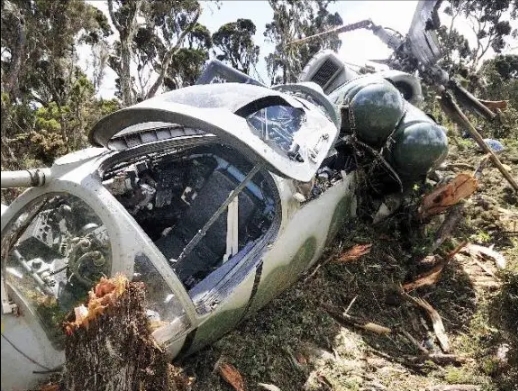
A Kenyan military helicopter carrying top brass including the defence chief crashed on Thursday, police said.
President William Ruto convened an urgent meeting of the National Security Council, his office announced after news of the crash emerged.
Defence forces chief General Francis Omondi Ogolla was among those on board the helicopter that went down in Elgeyo Marakwet county, about 400 kilometres (250 miles) northwest of the capital Nairobi, a senior police officer told AFP.
“The helicopter burst into flames after crashing and it had more than 10 senior commanders on board including General Ogolla,” the officer said.
READ ALSO: Heavy Floods in UAE, Afghanistan, Pakistan, 135 People Killed
“They were in the area on a security mission because there are KDF (Kenya Defence Forces) soldiers deployed in the region,” he said.
Earlier, there was no report of official comment on casualties.
“President William Ruto has convened an urgent meeting of the National Security Council at State House Nairobi this evening following a Kenya Defence Forces’ helicopter crash this afternoon in Elgeyo-Marakwet County,” State House spokesman Hussein Mohamed said in a statement.
Ogolla, 61, was appointed Chief of the Defence Forces by Ruto in April last year after a stint as deputy.
READ ALSO: Court Restrains EFCC From Arresting, Detaining Yahaya Bello
Ruto told journalists last May that he appointed Ogolla despite him being among those who tried to overturn his narrow election win against opposition leader Raila Odinga in 2022.
“When I looked at his CV, he was the best person to be (a) general,” Ruto said, adding his decision went against the wishes of many people.
A trained fighter pilot, Ogolla joined the KDF in April 1984, rising through the ranks to command the Kenyan Air Force in 2018, a post he held for three years.
However, in a latest report, President Ruto said Ogolla and nine other senior military officers died in a helicopter crash on Thursday.
He added that only two survived the air accident.
“Today at 2:20 pm, our nation suffered a tragic air accident… I am deeply saddened to announce the passing on of General Francis Omondi Ogolla,” Ruto said.
AFP
Headline
Heavy Floods in UAE, Afghanistan, Pakistan, 135 People Killed
Published
1 day agoon
April 18, 2024By
Editor
Around 70 people have been killed by heavy rains lashing Afghanistan over the past five days, the government’s disaster management department said on Wednesday.
Neighbouring Pakistan has also been hammered by spring downpours, with 65 people killed in storm-related incidents as rain falls at nearly twice the historical average rate, officials told AFP.
Dubai’s flagship Emirates airline cancelled all check-ins on Wednesday as staff and passengers struggled to arrive and leave, with access roads flooded and some metro services suspended.
Afghanistan was parched by an unusually dry winter that desiccated the earth, exacerbating flash-flooding caused by spring downpours in most provinces.
READ ALSO: Germany Arrests Two Alleged Russian Spies
Disaster management spokesman Janan Sayeq said “approximately 70 people lost their lives” as a result of rains between Saturday and Wednesday.
Fifty-six others have been injured, he added while more than 2,600 houses have been damaged or destroyed and 95,000 acres of farmland wiped away.
Giving a smaller death toll last week, Sayeq said most fatalities at that point had been caused by roof collapses resulting from the deluges.
The United Nations last year warned that “Afghanistan is experiencing major swings in extreme weather conditions”.
After four decades of war, the country ranks among the nations least prepared to face extreme weather events, which scientists say are becoming more frequent and severe due to climate change.
READ ALSO: E-Money Promises To Support Nollywood Actor, Junior Pope’s Children
At least 25 people were killed in a landslide after massive snowfall in eastern Afghanistan in February, while around 60 were killed in a three-week spate of precipitation ending in March.
In Pakistan, heavy downpours between Friday and Monday unleashed flash floods and caused houses to collapse, while lightning killed at least 28 people.
The largest death toll was in northwestern Khyber Pakhtunkhwa, where 32 people have died, including 15 children, and more than 1,300 homes have been damaged.
“All the casualties resulted from the collapse of walls and roofs,” the spokesman for the province’s disaster management authority, Anwar Khan, told AFP on Wednesday.
Dubai’s giant highways were clogged by flooding and airport passengers were urged to stay away on Wednesday as the glitzy financial centre reeled from record rains.
READ ALSO: Man, 40, Arrested For Allegedly Raping 14-year-old Girl In Anambra
Huge tailbacks snaked along six-lane expressways after up to 254 millimetres of rain – about two years’ worth – fell on the desert United Arab Emirates on Tuesday.
At least one person was killed after a 70-year-old man was swept away in his car in Ras Al-Khaimah, one of the country’s seven emirates, police said.
Passengers were warned not to come to Dubai Airport, the world’s busiest by international traffic, “unless absolutely necessary,” an official said.
“Flights continue to be delayed and diverted… We are working hard to recover operations as quickly as possible in very challenging conditions,” a Dubai Airports spokesperson said.
Climatologist Friederike Otto, a specialist in assessing the role of climate change on extreme weather events, told AFP it was “highly likely” that global warming had worsened the storms.

VIDEO: Villagers Give Nigerian Soldiers Heroic Welcome After Successful Operation

Best Airports In Africa For 2024 Named, Nigeria Missing [Full List]

Junior Pope: AGN Speaks On Possibility Of Dragging Movie Producer To Court [VIDEO]

Woman S*xually Abuses Child, Films It In Viral Video

Jnr Pope: ‘That Guy No Suppose Knack Bell’ – Boat Captain Narrates His Own Side Of Story [VIDEO]

Junior Pope: ‘Our Boat Captain Hit Fisherman’s Canoe’ – Survived Actor Narrates How It Happened [VIDEO]
Trending

 Metro4 days ago
Metro4 days agoJunior Pope: Photos From Funeral Of Makeup Artiste, Abigail Frederick

 News5 days ago
News5 days agoVideo: Moment Pastor Enenche Sent Lady Away For Giving False Testimony On The Altar

 Metro3 days ago
Metro3 days agoTwo Soldiers Arrested For Allegedly Stealing Armoured Cables At Dangote Refinery In Lagos

 News4 days ago
News4 days agoBREAKING: APC Suspends National Chairman Ganduje

 Headline4 days ago
Headline4 days agoUS-based Nigerian Bodybuilder Dies 18 Days After Being Shot By Wife

 News3 days ago
News3 days agoBREAKING: FG Begins Disbursement Of N200bn Palliative Loans

 Headline2 days ago
Headline2 days agoB-I-Z-A-R-E: Woman Wheels Dead Uncle’s Corpse Into Bank To “Sign Off” Loan In Her Name [VIDEO]

 News4 days ago
News4 days agoPastor Enenche Under Fire For Accusing Church Member Of Fake Testimony

 Metro3 days ago
Metro3 days agoTransformer Vandal Met Waterloo, Electrocuted In Benin

 Metro5 days ago
Metro5 days ago‘Side Chick’, Family Members Allegedly Attack Lover’s Wife
